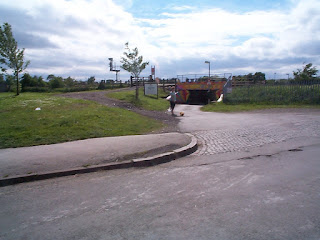This month's Derby Telegraph article strays into the territory of romance! If it ever appears on the Derby Telegraph website (which I doubt) I'll post the link here but, until then, here's a scan of the article with the unedited text below:
This is the time of year which
hotels and the like, have rather tweely christened 'Twixmas', in an effort to
give an identity to that awkward period between the business-end of Christmas
proper and the yet-to-begin mania of New Year.
It's as good a time as any to
take stock of presents received and desperately try to remember who gave them
to you. It was in this frame of mind
that I thought back to one Christmas at Wesley's, in Burton upon Trent in the
early 1970s, that was rather different from the others.
I think I've mentioned before
that I used to suffer from a crippling shyness, which was rather at odds with
surging teenage hormones and a factory full of girls. I happened to mention my dilemma to my mate,
Colin, the Serviette Department Manager, who was my absolute opposite in that
he had self-confidence in the same way that Blackpool has frontage.
I went on to point out one
particular girl in his department with whom I had chatted in passing and who
was rather attractive. Shortly
afterwards he said he had fixed me up with a date and we were to meet at the
Wetmore Bus Station. That early winter
night, I stood in the Bus Station, muffled in an old car coat of my Dad's
(which I thought looked rather sophisticated… I was wrong) and watched bus
after bus come and go, as did our appointed hour. After about two hours, I realised that this
was going nowhere and headed to my local, rather dejectedly and to the surprise
of all of those who were expecting me to be out on a romantic interlude.
The following day, in some
dudgeon, I collared Colin. He was full
of apologies and went to find out what had happened. It turned out that she thought Colin was
joking (he had a well-deserved reputation as a kidder) hence the
non-appearance. I went to have a chat
with her and she was sorry but it clearly wasn't going to happen. Consequently my self-confidence descended to
a new low.
Colin
However, shortly after this a
rather attractive girl started working right outside my office, on a
dilapidated piece of equipment which assembled the cardboard packing for toilet
flats (flat sheets of toilet paper, as opposed to rolls). Not an evidently romantic setting but you
have to work with what is there. Colin had clearly put a good word in about me and,
after a few bits of light-hearted banter as I came and went from the office
(which was necessary a surprising amount of times), I finally screwed up the
courage to ask her out, and she said yes!
We met at the Midland Hotel, a
pub on Guild Street/New Street corner which I fondly imagined was somewhere
posh (wrong again!). She looked amazing and
we got on like a house on fire. After a
couple of drinks, she asked if the Midland was my usual haunt, which I had to
admit it wasn't. The problem was that my
regular haunt, at that time, was The Alma Inn in Cross Street which was a back
street pub to end all back street pubs.
Nevertheless, she suggested we should pop in and visit, so we did.
Den (from my boozy Majorcan
holiday, if you remember) was looking after the pub for his dad, who had been
taken ill, and he and Kev (also from that holiday) were propping up the
bar. I must admit that the image I will
always regard as my favourite Christmas Present of 1974 were the looks on the
faces of the regulars, and my mates, when I wandered in with this stunning girl
on my arm. Life doesn't get much better
than moments like that!
Of course, the actual Christmas
present from my new girlfriend, some weeks later, was not quite the same
success, consisting as it did of a figure-hugging woollen top (and I've never
had a figure worth hugging) which looked like a knitted migraine. Oh well!
Thanks very much for reading my
articles in 2017. I hope you had a
pleasant Christmas and I wish you the very best for 2018.
Philip's latest collection of stories "The Things You See…"
is still available at the special introductory price of just £1.49, for a few
more days, at


















